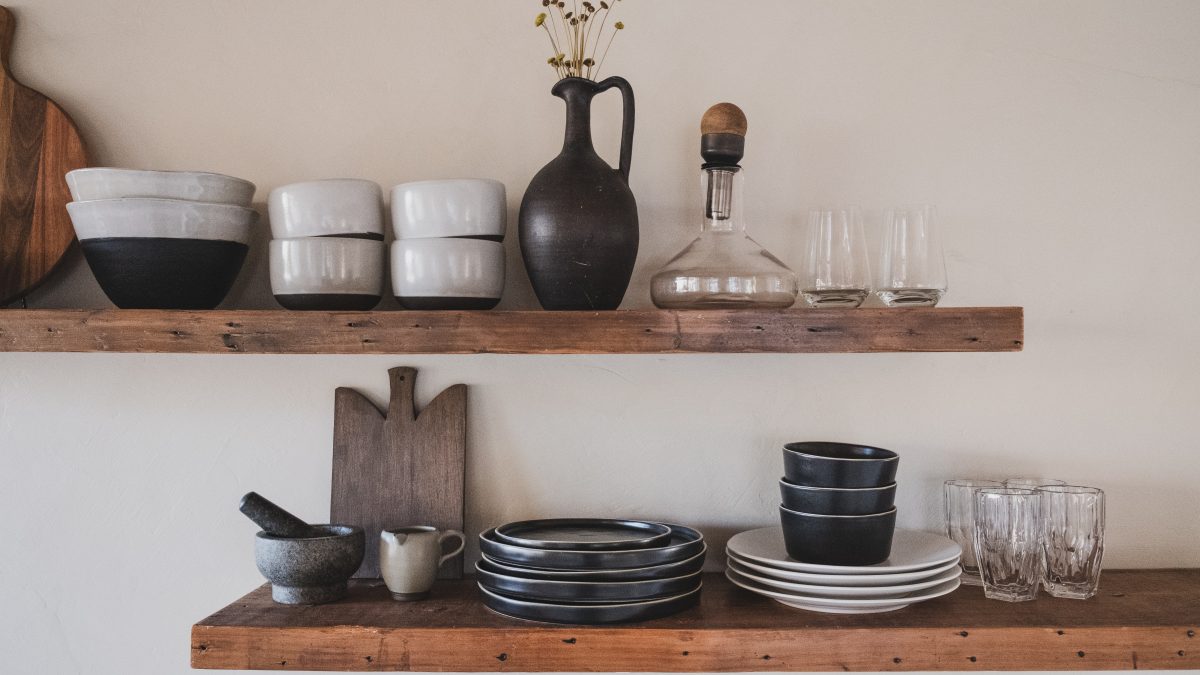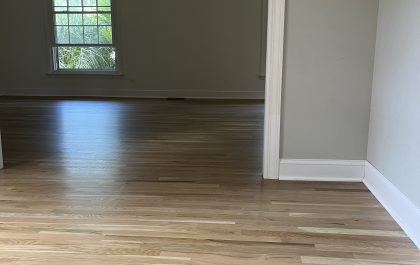For other articles in our Survival Mode Series, click here.
This month’s collection of tips center around organization. Physically organizing messy parts of our homes, or streamlining parts of the day that are particularly stressful, like school mornings or the awkward time after afternoon naps and before dinner, will help us feel calmer, cooler, and more in control.
After hearing one of my favorite psychologists explain how clear pathways to goals produce positive emotion, everything clicked! If we can form our environment in a way that eliminates as many obstacles as possible, and organize our schedules and homes so they produce the clearest pathways to our goals, we can make serious headway in feeling more positive emotion!
Our lives in Survival Mode are usually frenzied and disorganized, and not filled with practices that are sustainable in the long term. That’s because when we’re in Survival Mode, we’re stuck thinking in terms of now. We’re just trying to survive and keep our heads above water for this moment.
Organization can help stretch our ability to think beyond the current difficult moment by making life easier!
Even if you’re not Type A, or hyper-organized by nature, putting effort into streamlining our environment and our schedules in ways that work for you and your lifestyle can facilitate the development of clear pathways to our long term goals.
Read on to see how these Everyday Mamas organize their everyday homes and schedules to combat the anxiety of Survival Mode. We hope a tip or two will leave you feeling inspired and encouraged too!
Pantry overhaul
Our co-founder Halley is a mom to triplet boys and a new baby girl who found that literally clearing away the physical obstacles in her pantry helped streamline the meal prep and snack time rush, while also helping her feel calmer and more at peace.
By Halley Netsch (@halleynet), mom of four:
When dinner time rolls around, how often do you find yourself staring at your pantry — not even sure where to start to find something you need to make dinner?
If you’re anything like me, you’ll probably be found rummaging through an endless sea of miscellaneous salad dressings and boxes of crackers before you can maybe find the item you were looking for. A frustrating mixture of all the things we use to cook and store food, lots of things hidden and nearing (or passing) their expiration dates totally undetected.
It was enough to make anyone confused, stressed, and definitely overwhelmed. I kept telling everyone around me that I needed to organize the pantry and then one day, my husband offered to play with the boys for a few hours so I could actually do it. (Find the full project details here!)
Surprisingly, I found that this little organizational project was exactly the self-care I needed during this phase of our lives.
It gave me time alone, time to shop and to be creative on what would fit where, time to think about something other than who pooped when and what snack is likely to go over best — and, best of all, it gave me this little room where order reigns.
Instead of walking into my pantry and feeling my panic rise as hungry kids bang on the door with increasing intensity and I can’t find anything but Thai sauce, I walk in and instantly feel a sense of calm.
Establish a sleep schedule
We often fall into Survival Mode when something disrupts the predictable rhythm of our normal lives. Healthy schedules that are flexible, yet stable can help mitigate the stress and anxiety that often accompanies survival mode by reestablishing a predictable rhythm to our days. Our favorite baby sleep expert Andrea De La Torre of Baby Sleep Answers shares developmentally appropriate ways to organize your baby’s nap times with predictable patterns and routines!
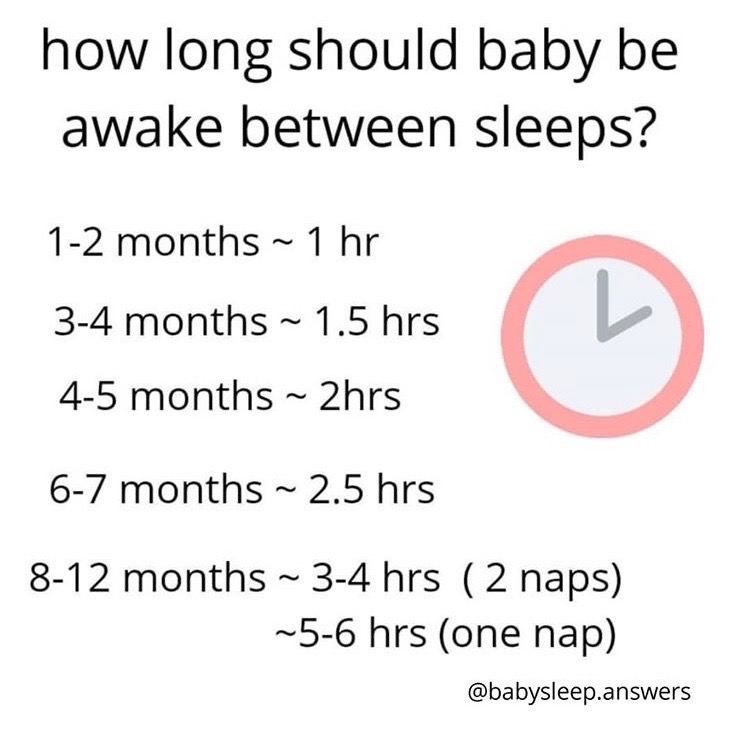
By Andrea De La Torre (@babysleep.answers), mom of two:
Newborns:
Focus on trying out a routine of eat-play-sleep or play-eat-play-sleep. Having this will give you a sense of a routine and help baby get used to falling asleep without having to eat.
4-5 months (3-4 naps):
Focus on putting baby down every 2 hours. Feed five minutes after they wake up, play, and then go through a small naptime routine before putting them down.
6-9 months (3-2 naps):
Focus on putting baby down every 2.5-3 hours (maybe just 2 in before the first nap!). Feed five minutes after they wake up, play, and then go through a small naptime routine before putting them down. Offer solids during their awake time, and then naptime. Don’t be afraid to feed before nap again if they’re hungry.
9-12 months (2 naps):
Try to put baby down every 3-4 hours (maybe less time before the first nap). Feed five minutes after they wake up, play, and then go through a small naptime routine before putting them down. Offer solids during their awake time, and then naptime. Don’t be afraid to feed before nap again if they’re hungry.
12 months+ ( if on 1 nap):
Have mealtimes with adults plus 2-3 snack times throughout the day. Downtime or naptime after 5-6 hours of being awake. Bedtime 5.5-6.5 hours after down/naptime.
Streamline food prep for school mornings
Regardless of whether your little ones are in school, organization that puts your mind at ease and provides your littles with a sense of independence is the best kind! Katrina of Rose Harrington art shares how some Sunday evening prep can make all the difference in the coming week.
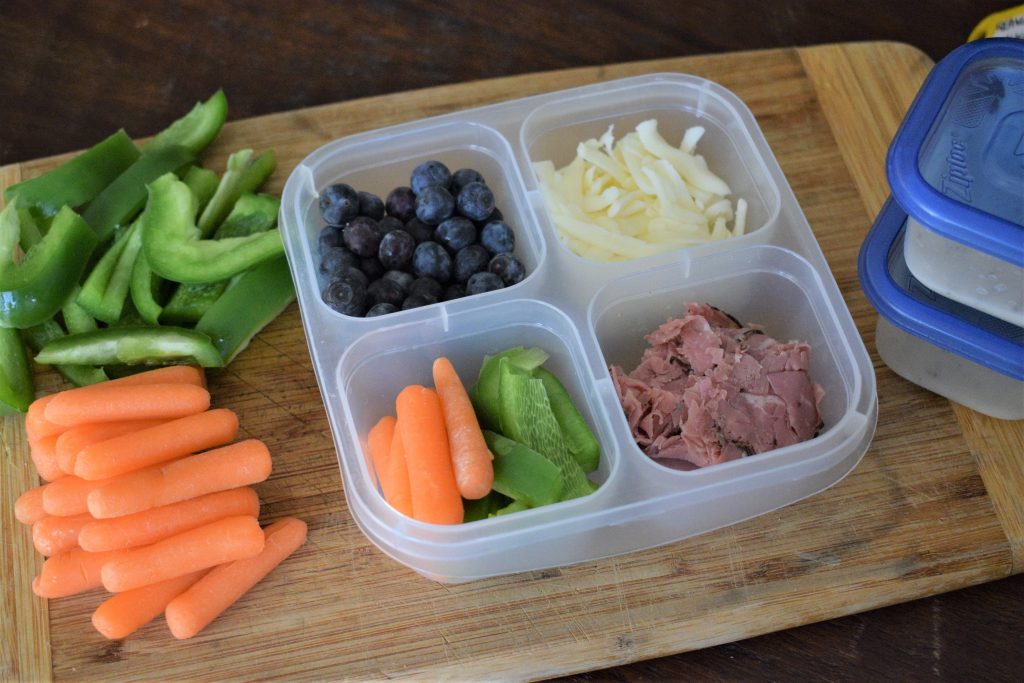
By Katrina Harrington (@katrinaharrington), mom of five:
Last year when my son was in kindergarten, I would go to bed and already be dreading packing his lunch the next morning. We didn’t ever make anything complex or photo worthy, but I think it was just one more task for my scatterbrained self to worry about. Did we have anything in the fridge that would suffice? Did we run out of plastic bags? Are we going to be late?
This year I decided to try something new; his lunches would be prepared before the school week began. For each day, I bought food containers with four compartments and single serving ones for dips. These are similar to bento boxes, but not as expensive so I could buy multiple.
Every Sunday night, I fill the containers. Surprisingly, seeing the lunches stacked in the refrigerator has – no exaggeration – become one of my favorite sights to see. Now each school day, my son grabs the containers from the fridge, zips up his lunch box and puts it in his backpack.
Mornings are so much easier, and when I grocery shop early enough on Sundays, he can prep the lunches himself. I may dread the day when he is completely independent and away from us, but this kind of independence is very welcome.
Organize the afternoon
In a constant effort to trim down TV time, editor Gabby shares how having an organized plan for the afternoon helps her feel less overwhelmed and sets her up for (relative) success.
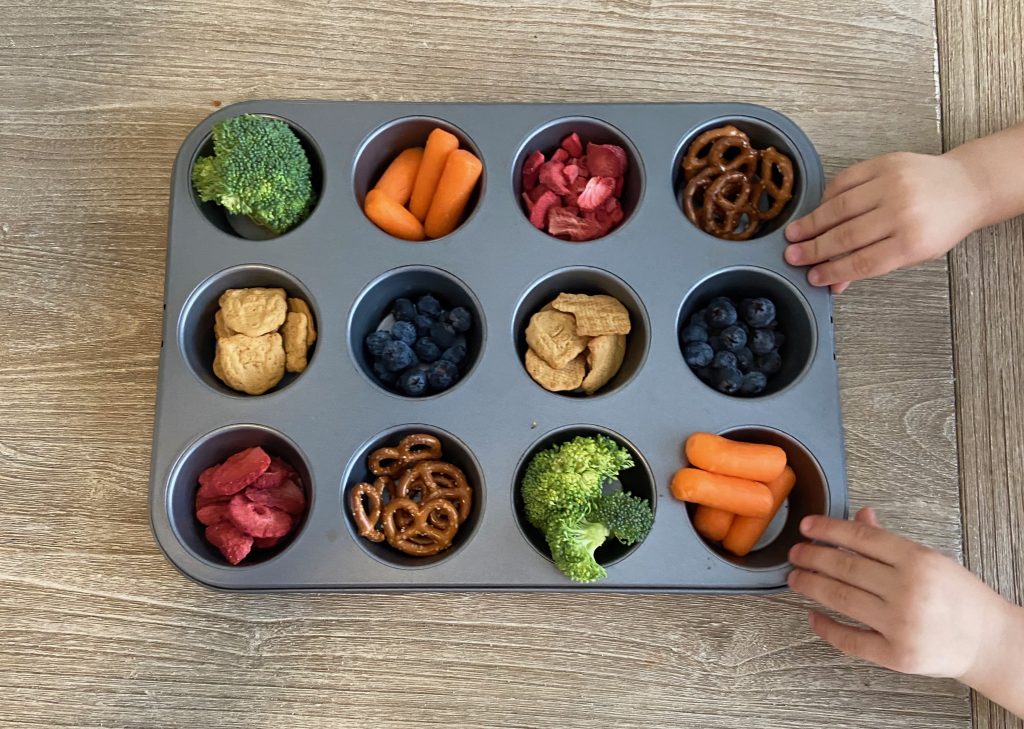
By Gabby Kewell (@gckewell), mom of three:
I always struggle to fill those late afternoon post-naps and pre-dinner hours. Everyone’s a little tired, a little hungry, and a little rambunctious, which, when taken altogether, makes me a little crazy. When I leave this time unorganized, I find myself reverting to Survival Mode until my husband comes home from work.
So, in an attempt to avoid resorting to 2.5 hrs of TV and unlimited access to the snack cabinet, I’m trying to be intentional about organizing my time in those late afternoon hours.
These small changes have helped me exponentially, and I hope they help you too!
Muffin tin snacks
After naps, I fill up a muffin tin with fruits, vegetables, and healthy snacks, and leave it on the table until dinner. This small strategy allows my kids more independence, and reduces the amount of times we go head to head over what snacks they can eat that won’t spoil their dinner.
They know they can eat the snacks on the table if they’re hungry, and since again the snacks are mostly fruits and vegetables, I’m glad to give them free reign on those foods up until dinner.
Outside time
After the kids have some snacks, I try to get them outside to ride bikes, scooters, play in the backyard, and ultimately burn energy any way they can. We use these balance buckets and these step-a-logs for obstacle courses, water the plants with spray bottles, and chalk up the hardscape. When it’s time for me to start dinner, we come back inside and I “set up” something for them to do.
Invitation to play
When combating Survival Mode, it’s important to know your strengths or else the battle to attain a new normal will be more uphill than necessary. For example, planning for and setting up designated activities is not my forte.
So, when I say that I “set up” something for the kids to do this is what I mean: I’ll lay out the art supplies and paper on the table, or move the dollhouse and a bin of toys to the middle of the carpet, or pull out the bin of blocks and tracks to encourage them to build. Really, it’s putting toys or supplies out in the open for use. Taking 5 seconds to do this can save an entire afternoon!
Junk Drawer Clean Out
Co-founder Monica, mom of three, spent just 20 minutes addressing a constant clutter spot—her kitchen junk drawer—to bring some sanity to a frequently used space. Even small projects like these can make a such difference in day-to-day life!
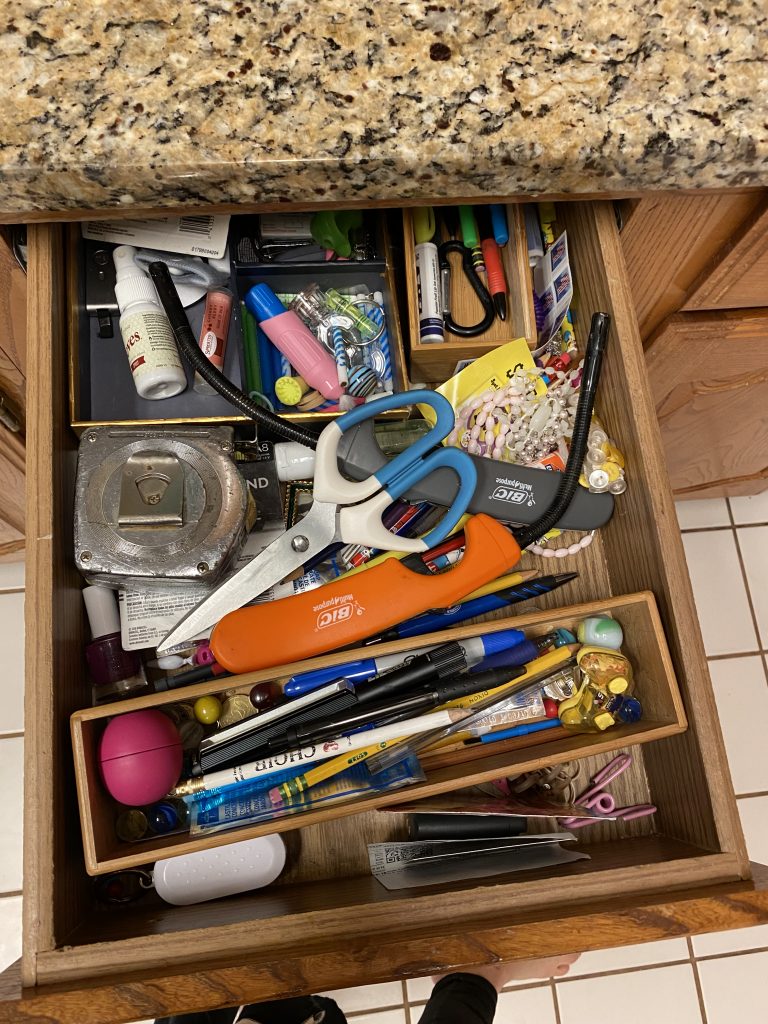
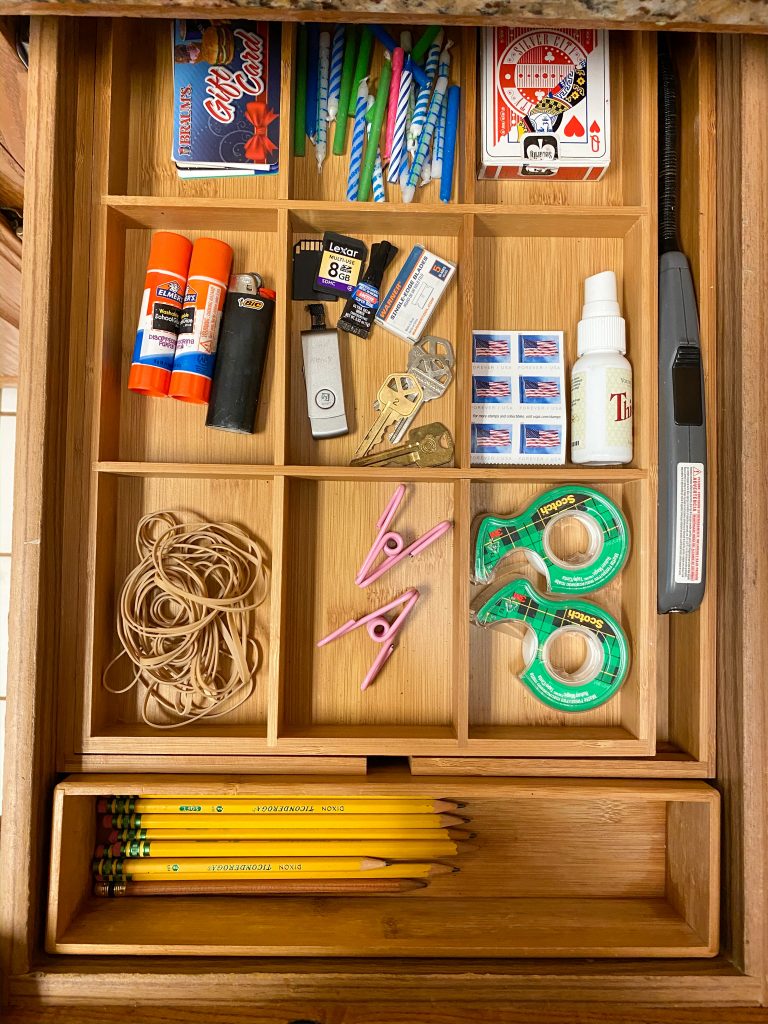
By Monica Aberle (@mon.aberle)
Last week, I tackled my always-cluttered junk drawer.
No matter how often I clean this spot out, it still finds it’s way looking crazy and unmanageable just about every.single.week. I don’t know about you, but small clutter spaces like these (especially in the kitchen, where the spot is used and seen frequently) give me anxiety. I just never want to open a messy drawer!
With all that’s been going on with coronavirus lately (kids needing extra attention), I haven’t found a ton of extra time on my hands, but I wanted to tackle something small in my house to have ONE spot with some semblance of order. This project seemed totally manageable given that it took me a total of about 20 minutes.
I bought this expandable drawer organizer and got to work. I got rid of a TON and put away the rest of the things in their proper places (or found new homes for them).
I have to say that having this organizer is key because: 1) it expanded to fit the space perfectly and 2) it forced me to purge of extra unnecessary stuff that wouldn’t fit in the spaces. Now that there are special compartments for things, my tendency to just throw extra items in there has significantly decreased. I want to keep it looking nice and tidy as long as possible!
Even though this is a small project, seeing the end result made such a difference in decreasing my stress level that day. And since I use this drawer every day, I’m still reaping the benefits.
If you find yourself with 20 extra minutes, this might just be the perfect project for you!
Visit some of our favorite resources for more home and schedule organization tips!
In Honor of Design for home organization
The Small Things Blog for closet organization inspiration
ClutterBug for helpful quizzes on what style of organization best fits your personality
Organizing Moms for organizing printables
Gabby Kewell
Related posts
Recent Posts
Flooring Renovation: Asbestos Removal and Choosing the Perfect Floor Stain
We finally completed the renovation of our first-floor flooring, and like most renovations, it was a bit more involved than we initially hoped for. When we bought the house three years ago, we knew the…
Roses are red: 8 beautiful shades of a paint color you might not realize you love
Lots of us love blues, greens, whites, and greys. And if neutrals are more your thing, you might think you need to stay far away from a color like red. But we think it’s worth…

